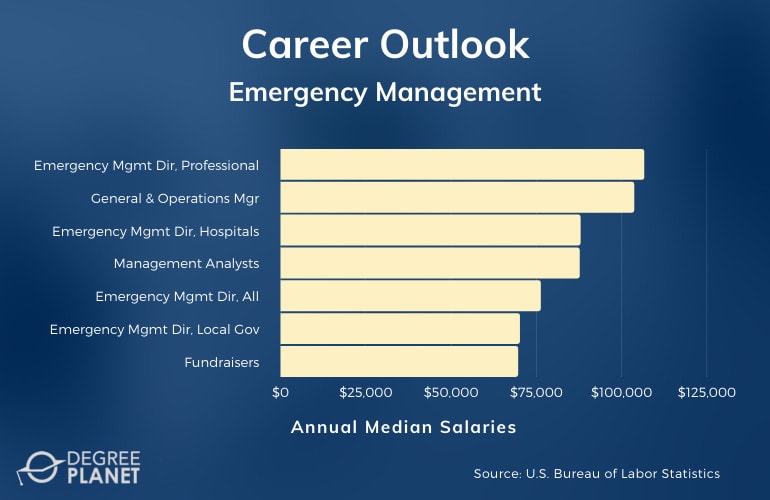What can you do with an emergency management degree? Emergency management degrees can lead to dynamic and ever-changing work in a variety of industries.

Careers in this field are often connected to disaster relief-related work and community outreach.
Editorial Listing ShortCode:
The skills you can develop through an emergency management program are also adaptable to future roles in leadership.
What Can You Do with an Emergency Management Degree?

Those with an emergency management degree may pursue roles in disaster relief services. They can put in extensive work to ensure communities are prepared and ready to respond to disasters.
Emergency management professionals can also assist with the recovery and repair of basic services following a crisis and work to prevent future disasters. There are disaster relief volunteers who serve until a recovery period has been completed, but you can also seek a full-time job in emergency management.
Some professionals plan and research to assess future weaknesses within a community. Others may also educate the public to increase their preparedness for future issues.
Editorial Listing ShortCode:
Common careers in this field include emergency management director, crisis analyst, social and community service manager, and hurricane program manager, just to name a few.
The Bureau of Labor Statistics anticipates average growth for emergency management directors. The demand for minimizing risk from emergencies will likely sustain the demand for experts in this field.
5 Things You Can Do with an Emergency Management Degree

The work you do with an emergency management degree can be profoundly unique to the field you are working in. Every role, though, typically requires you to be responsible for the well-being and disaster preparedness of your community in one way or another.
1. Emergency Management Director
Emergency management directors need extensive problem-solving skills.
They are often responsible for the emergency preparedness of communities, the coordination of planning for disaster relief and emergency response, the recovery of the community, and the mitigation of what steps to take to lessen risks for future issues.
2. Crisis Analyst

A crisis analyst looks at community data, infrastructure, and services to coordinate the logistics of future response to a humanitarian crisis.
They often work directly with government organizations or agencies, such as homeland security, to respond to community and global conflicts and problems.
3. Social and Community Service Manager
Social and community service managers often work for nonprofit organizations, the government, or social service companies. They can meet with community members to better understand problems within the community and plan how to establish funding for the well-being of all.
4. Hurricane Program Manager

A hurricane program manager is responsible for planning disaster responses for hurricanes in particular. They also develop and provide response training and organize emergency procedures for communities.
5. Nuclear Emergency Planner
This position is responsible for radiological emergency management. If there is an incident or accident, nuclear emergency planners are responsible for providing recommendations to the organization or community on how to respond and control the situation.
Emergency Management Careers & Salaries

Disaster relief work is unique, as are the many career opportunities this degree may lead to. The Bureau of Labor Statistics anticipates 4% job growth for emergency management directors in the next ten years.
| Careers | Annual Median Salaries |
| Emergency Management Directors, Professional, Scientific, and Technical Services | $106,570 |
| General and Operations Managers | $103,650 |
| Emergency Management Directors, Hospitals | $87,920 |
| Management Analysts | $87,660 |
| Emergency Management Directors, All | $76,250 |
| Emergency Management Directors, Local Government | $70,130 |
| Fundraisers | $69,610 |
| Social and Community Service Managers | $69,600 |
| Emergency Management Directors, State Government | $66,730 |
| Community Health Workers | $42,000 |
With the wide range of options in disaster management, you may take your degree into numerous industries.
Is Financial Aid Available?

There are a variety of financial aid opportunities available to students who qualify. You can apply for grants, scholarships through your school, or federal or state aid. If you’re a volunteer in an industry, they may help sponsor your schooling as well.
If you are looking for financial aid, you can start by filling out the Free Application for Federal Student Aid (FAFSA). Anyone can apply for this federal aid for their studies, but some schools do have deadlines for FAFSA approval.
What Is Emergency Management?
Emergency management is divided into four different phases: preparedness, response, recovery, and mitigation.
Professionals in the field often work full-time jobs that require the planning and development of emergency responses for their community or organization. They typically come to understand the needs of their community, work in disaster management, and try to reduce the effects of these disasters.
Editorial Listing ShortCode:
Experts in the field may also provide relief through their knowledge and understanding of funding, economic needs, and infrastructure. There are also those who train community members for preparedness should disaster strike.
Other duties that fall under emergency management include preparing for emergency situations and leading responses to those situations. Emergency management directors are often the ones to manage and formulate response plans or analyze community resources for emergency procedures.
Can You Earn an Emergency Management Degree Online?
Yes, there are online programs from accredited institutions that enable you to earn an emergency management degree online. You have the ability to train and develop the skill set for future emergency management jobs in an adaptable online setting.
Distance learning allows you to organize your educational growth around your present life. You can learn the same problem-solving skills for disaster relief and response as you would in an on-campus setting. There are programs at a growing number of universities that offer bachelor’s, master’s and even a PhD in Emergency Management online.
What Skills Will You Learn with a Degree in Emergency Management?

The skills you can develop with an emergency management degree program are extensive. You often go through training that helps prepare you to work in dynamic environments and respond to fast-paced situations.
Here are some skills that you may develop through your program:
- Leadership skills
- Problem-solving skills
- Verbal and written communication skills
- Quick decision-making skills
- Critical thinking skills
- Fundraising skills
- Data analysis and research skills
- Technological skills
Through this degree program, you may also learn how to work in government settings and how to assist people emotionally during times of crisis.
What Jobs Can You Get with a Degree in Emergency Management?
There are many jobs you can pursue with a degree in emergency management. The Bureau of Labor Statistics anticipates growth in emergency relief services as the need for assistance in this domain is sustained year after year.
Emergency management or relief services can be found in various sectors, such as government, healthcare, or nonprofit. There can also be work in the natural disaster and environmental domain.
Editorial Listing ShortCode:
Emergency management careers include crisis analyst, safety specialist, emergency management director, emergency response team leader, and even nuclear response specialist.
If the thought of working in crisis management appeals to you, you might want to pursue a degree in emergency management to gain some relevant training and necessary skills.
Where Can You Work with a Degree in Emergency Management?

Most professionals in the emergency management field work in local government. They can also work in community social fields, hospitals, environmental industries, and nonprofits.
There is a need for crisis management in nearly all industries and in large corporations. So, emergency management experts may be found in nearly any industry, according to their specialty and strengths.
How Much Money Do Emergency Managers Make?
The median salary for all emergency management directors is $76,250 (Bureau of Labor Statistics). Most earn between $42,230 and $142,870 per year. The amount you can make as an emergency manager varies depending on your industry, work experience, and employer.
Emergency management directors earn the highest salary in professional, scientific, and technical services. They earn a median salary of $106,570. Yet, the majority of emergency management directors work in local government. The median salary for this profession in local government is $70,130.
What Does an Emergency Management Specialist Do?

Emergency management specialists are responsible for planning crisis management services.
They can provide training for emergency response and create plans and procedures for disasters. In the event of a crisis, they try to ensure that everything runs smoothly so that recovery happens quickly and life can return to normal.
Dealing with the aftermath of a disaster involves improving plans, assisting in the rebuild of communities and the economy, and delegating social services for community members. An emergency management specialist can be involved in crisis management for anything from natural disasters, wartime, or technological disasters.
Is Disaster Management a Good Career?

Yes, disaster management is a good career for many professionals. The Bureau of Labor Statistics states that there is an ongoing need to prepare for and minimize the risks of emergencies, so the demand for employment in this field is consistent.
The variety of industries you could potentially work in, depending on your specialties and interests, are extensive. This field can also be very dynamic, as no disaster or crisis is identical to another.
Is a Degree in Emergency Management Worth It?
Yes, a degree in emergency management is worth it for many students. A degree program in emergency management can help you develop your ability to think critically and quickly in stressful situations. This skill set is important for leaders in crisis response.
There is a constant and steady demand for crisis management in a variety of industries. The Bureau of Labor Statistics projects that emergency management directors will experience 4% job growth through the next decade.
Getting Your Emergency Management Degree Online

In an online emergency management degree program, you can learn valuable skills that can help equip you to work in exciting, fast-paced, and rewarding careers in a variety of industries.
The need for crisis management will continue to be required from governments, healthcare industries, and technological and environmental domains. Disaster relief services are essential to the community, and an online emergency management degree can help prepare you to play a part in this rewarding, essential field.
The different sectors of emergency management—preparedness, response, recovery, and mitigation—can lead to varying positions within the field, depending on your interests and chosen specialization.
If you’re ready to begin your training in crisis management, you may want to explore accredited online emergency management degrees to find the one that best fits your professional goals.

